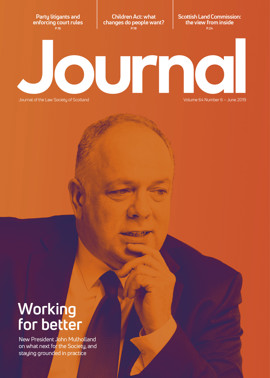Revealed – by your AML certificates

Money laundering enables organised crime groups to conceal their assets and advance criminal operations. The legitimate services of the Scottish legal profession, which contribute some £1.5 billion annually to the Scottish economy, are often targeted by criminals for illegitimate purposes. While we cannot be sure of the exact figures, recent National Crime Agency estimates put the financial impact of money laundering in the UK at more than £100 billion.
It stands to reason, then, that measures to tackle money laundering are high up the list of priorities for the UK and Scottish Governments. Professional body AML supervisors are under pressure to ensure ever more effective and efficient AML supervision. In recent years, the Law Society of Scotland has ramped up its supervisory activities, and last year all Scottish law firms covered by the Money Laundering Regulations 2017 were required to complete an AML certificate.
This first AML return provided valuable insight into inherent money laundering risks at solicitor and firm level. Some headline findings follow.
Non-UK clients: 62% of firms have dealings
Scottish solicitors carry out professional duties with clients and colleagues around the globe, from Iceland to India, China to the Cayman Islands. Some jurisdictions are inherently higher risk in terms of money laundering and it is therefore critical that due diligence and robust AML checks are carried out.
AML certificate analysis revealed that even some of the smallest firms supervised by the Society did business with corporate structures in inherently high-risk or secrecy jurisdictions such as the Seychelles, British Virgin Islands and the Bahamas.
In terms of client account transactions, firms received payments from or made payments to jurisdictions including Brunei, Iraq, Kuwait, Laos, Panama, Russia, Saudi Arabia, United Arab Emirates, Vanuatu, Zimbabwe and more.
Conveyancing: most time spent
The National Crime Agency has identified the property market as vulnerable to criminal exploitation. The Society's analysis shows that over a third of its supervised population spends more than 50% of its working time on residential conveyancing, so this area of practice requires careful compliance with policies and procedures.
In addition, 32% of solicitors carry out conveyancing transactions in excess of £1 million.
High value real estate in Edinburgh is mentioned specifically in HM Treasury’s National Risk Assessment 2017. Property represents an attractive way for proceeds of crime to be turned into an asset in a single transaction, and the use of companies or overseas trusts in a purchase is a common occurrence in suspicious activity reports and police investigations.
TCSP: further work
Trust or company services provision (TCSP) can include management and creation of trusts and companies, providing a registered office to clients and a nominee shareholder or a director to a client. TCSP has come under increasing scrutiny in recent years and is identified as at the highest inherent risk of exploitation in HM Treasury’s 2017 National Risk Assessment. TCSP coverage across the Scottish legal profession is not quite clear yet, but the Society is currently carrying out a thematic review and analysis, and will adjust the AML certificate to improve understanding in this area.
PEPs: in the hundreds
Politically exposed persons (PEPS) are individuals entrusted with prominent public functions – for example, government officials, heads of state or judges.
Because PEPs often hold positions that are open to abuse, Financial Action Task Force recommendations require the application of additional anti-money laundering and combating financing of terrorism (AML/CFT) measures. The 2017 Regulations require that PEPs and their families or close associates be subject to enhanced due diligence.
These requirements are, of course, preventative in nature, rather than suggesting that PEPs are necessarily involved in criminal activity.
The AML certificate results showed that, across Scottish legal firms, there were about 383 PEPs recorded as clients for the period the certificate covers.
Suspicious activity reports
Suspicious activity reports (SARS) are instrumental in helping law enforcement agencies to identify suspects, uncover crime and reveal criminal methods and trends, enabling informed allocation of resources. The UK Financial Intelligence Unit receives and processes requests for a defence against money laundering or terrorism financing offences, so if a Scottish solicitor has suspicious funds in their client account, they will need to submit a Defence Against Money Laundering SAR (DAMLS) form before moving the money anywhere. Over the AML certificate period, Scottish solicitors submitted more than 200 SARs and more than 100 DAMLS. The Society anticipates that these numbers will rise as AML measures continue to intensify, and awareness and momentum builds.
Fraser Sinclair, the Society’s AML auditor and AML certificate lead, commented: “The findings will help us to develop and execute our risk-based approach to supervision, allocating our resources for maximum impact. And of course in sharing the results, the profession can better understand where the risks lie and take the appropriate preventative measures.”
Find out more about AML on the Law Society of Scotland website: www.lawscot.org.uk/aml/Perspectives
Features
Briefings
In practice
- Tradecraft – one solicitor's experience
- Dear employer...
- Team building – for the Foundation?
- Accredited paralegal practice area highlight: conveyancing
- Accredited Paralegal Committee profile
- What's new for paralegals?
- Ask Ash
- Managing the risk of workplace stress
- Appreciation: Iain Alexander Macmillan
- Revealed – by your AML certificates






